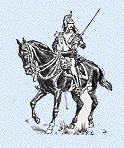Odessa, S. Russia - A Brief History

Odessa Harbor - Winter of 1986
Photographs above by Pat Hubert
Edward Remick Remembered Odessa
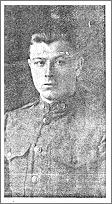
- 1918 - U.S. Army ...WWI
The seventy-nine year old man, who was holding out his military medal for me to admire, was my grandfather, Edward [Eduard] Remick [Remmick / Roemmich] born in Worms which was a German-Russian Colony near the Russian Black Sea port of Odessa. [See his family history.]
There were many many stories this man had told me since the time I was a small child sitting on his knee.
I looked down at the medal and read:

|
"THE GREAT WAR FOR CIVILIZATION" [Under these words were stamped the names of the following countries:] "France, Italy, Serbia, Japan, Montenegro, Russia, Greece, Great Britain, Belgium, Brazil, Portugal, Rumania, China" |
"How many of these countries were you in grandpa?" I asked.
"All of them," he replied.
"ALL?" I sounded with doubt in my voice.
"Yes," he replied as he sat down and picked up his pipe and opened up the jar filled with sweet smelling tobacco while he continued. "I remember Germany more than the others," he recalled. He had not mentioned Russia since we knew he had loved old Russia ,where he had been born, more.
"Doesn't say Germany on the medal?" said I.
"Oh, we were in Germany," assured my grandfather. "I was luckier than most. Since I am German and speak German, the women in Germany fed me well and gave me down feather beds to sleep in." He had a distant look in his eye for a moment before adding. "The mothers hoped the mothers of Germany's enemies were treating their sons as kindly."
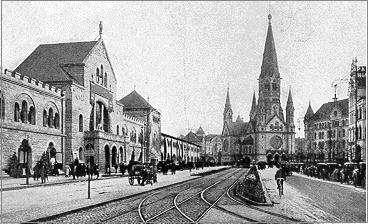
Old Photograph is marked "Hardenberg Street with the Church of Kaiser Wilhlem in Background"
"What about those who weren't as lucky?" I wondered.
"They were sent out to the barns and the chicken coups that didn't have anymore chickens in them but smelled like chickens just the same," he uttered as he pulled like his pipe.
"What else do you remember about Germany?" I hope to solicited everything I could which the old man could remember. I was writing a novel: Forgiveness Day and wanted it to be accurate.
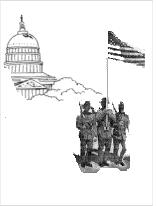
|
Edward Remick has been part of the color guard at the White House, Washington, DC before going to Europe.
|
Later in the conversation, grandpa informed me, "I had to sign on longer in the army in order to finish up our work ...."
One of places he helped evacutate was Odessa, S. Russia.
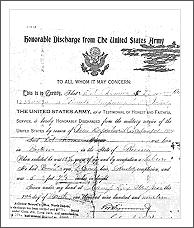
|
According to the papers found in Edward Remick's things, he
was discharged the first time on 13 March 1919...
Signed by a Colonel of the 50th Infantry..... The document also tells us he was born in "Bodessa" [Odessa], had light brown hair, ruddy complexion and was 5 feet 9 1/2 inches tall .... name: Edward Remick Army #2,380,430 Regisrant: no, under age Birth Place: Streeter, . Dak. Birth Date: 20 Aug 1900 Parents Origin: of Russian parents Occupation: Farmer Comment: enlisted at Bismmarck on Jan. 7, 1918; sent to Jefferson Barracks, Mo.; served in Commpnay L, 50th Infantry, to discharge. Discharged at Camp Dix., N. J., on March 13, 1919, as a Private. |
"Odessa wasn't far from where you were born," I commented.
I had just been reading history on the background of my grandfather's family who were called German-Russians which meant his ancestors had migrated from Germany to Russia, where they remained in German colonies, married German-Russians and continued their German customs, language, traditions and religion.
Just a few years short of a hundred years later, my grandpa migrated with his family to the USA where they landed in Philadelphia. My grandpa unofficially left the ship and was given a ride in a dog cart by it's owner, a girl, who was about his age, six or seven. They traveld up and down the pier. She gave him two small American flags to wave to help her and all Americans to celebrate the birthday of the USA. It was 4 July 1907.
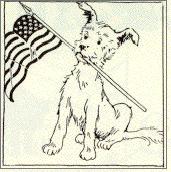
I returmed my thoughts to my question: "About how far was Odessa," the Black Sea Port," from your village of Worms?".
Grandpa answered, "Odessa was about ninety miles." His thoughts went back into time. "It would take me and my grandfather," [Jakob Roemmich], "many days in a loaded grain wagon to reach that old city."
"Where was your father?"
"My father," [Quartermaster for the Tsar's Army], "was in Vladivistok, " [an eastern sea port town, " trying to stop the Japanese," he explained, "and grandfather didn't trust anyone about the sale of the grain because there was a lot of money involved, so he would go each time and the last two times he took me with him."
Odessa was sowing in an average year some 6,850,000 bushels of winter wheat, about 13,000,000 bushels of rye.....from 1893 to 1897 in the Kherson district alone. I don't know the figures between 1897 and 1905 nor the production of the Odessa district. The numbers I had read in a friend's, Joseph S. Height's, book called PARADISE ON THE STEPPE. Perhaps if I used some numbers I could figure out the answer. The average harvest was about 13 bushels per acre for rye and about 10 bushels for wheat.... The German-Russians in the Black Sea region held about 11,340,000 acres of land. They had brought in machines as far away as the US because cousins told them about the new machines called like the "binders" [ties the wheat] like the McCormick "Daisy" and the Ohio "Buckeye" and the six foot Milwaukee .... There was the Marsh Harvester that needed three men.... which was known as the "brow beater".
The Roemmich families had been prosperous. They owned 7 chutors [estates similar to the old southern plantations without the pillared three story mansions].
"Tell me about your trips to Odessa on a wagon, grandpa," I urged.
"First, grandmother would pack us these baskets full of food," the old man quickly recalled as he puffed on his old pipe and the smoke rose up and gather above his head. "There would be sausages of all kinds, loaves of bread, and fruit.... " He smiled his warm smile. "No one went hungry if grandmother had anything to say about it."
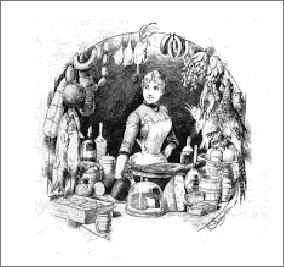
"No one went hungry if grandmother had anything to say about it."
"How many wagons and people traveled with you and your grandpa?" I questioned.
"There were a lot of wagons and three times as many people, if not more," he replied as he squinted his eyes as if to look back and see what was.
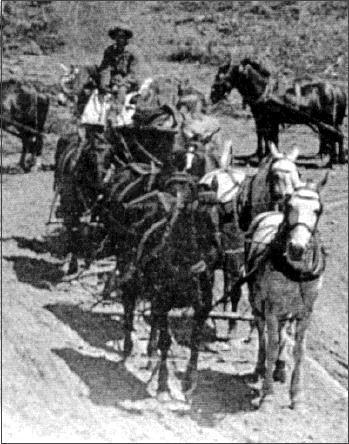
|
August Reimann - 1910 Although this isn't a photogrpah taken in Russia, the scene probably was similar to that of August Reimann who was hauling his grain from Roy to the railhead in American Falls, Idaho, USA in 1910.
See next page for story on Grain Harvest. Photograph from Opal R. White, daughter of August Reimann. |
"Where did you stay at night?"
"Mostly under the stars," grandpa told, "because my grandfather liked looking up and seeing God's lanterns twinkling in that huge old sky."
"Didn't the nights get cold on those autumn nights?" I inquired.
"Grandmother and mother made sure we had warm down feather blankets and pillows with special covers that could be washed," then he paused as if remembering something he didn't share with me then continued with what he was willing to tell me. "That is why I felt so at home in Germany in those fine feather beds that were so like the ones we had in Russia in grandfather's house."
"Did you ever sleep in peoples homes in the villages through which you passed?" I asked.
He didn't anwer immediately.
I knew that grandpa was thinking about those nights he had spent with his grandfather whom he loved so much.
"Plus he wanted to make sure no hooligans made off with any wagons," he added.
"Hooligans?" I issued.
"There were bands of these thieving hooligans who would steal another man's processions because they were too lazy to work for what we had worked so hard to have and sometimes they even killed to get what they wanted," revealed grandpa. "That is why a group of farmers would travel together and have hired men to shoot these hooligans if it was found necessary."
Sounded like the old wild west of our USA, I thought.
"Did you ever see any?" I asked in search of a more exciting adventure.
"There were always too many of us," he replied. "Too many..." And he seem to remember more than just the long line of wagons hauling grain across the huge flat steppes of black earth that had been virgin soil until the Germans set a plow to it after the early 1800s.
"What did you do when you reached Odessa?" I urged for still more stories even though I could see he was getting tired. But our time visiting was coming to an end and I wanted to know as much as I could. I had waited far to long already, I thought. And, this might be the last time I ever saw him. He was 79 and showing his age more since the death of his second wife, Lucile.
"First thing we did was drive our wagons to the grain station, weigh and set the price which was always good since our grain was always the best," he uttered with great pride.
"I hardly think you sat around all that time with the adults," I fished for old stories I had heard so long ago but wanted to hear again, "as they sat waiting to be weighed."
Since there wasn't my mother or grandmothers around to tell me I couldn't go, and since grandfather thought I should learn as quickly as I could to be grown-up,." he voiced as a small smirk came to his face, "I tagged along with the big kids who were off to investigate."
"Were there small city hooligans?" I asked to urge him farther in the direction I wanted our conversation to take.
"Oh, yes, there were city hooligans who were real ruff and carried sticks that were as thick as a man's thumb which they waved threatenly at us as they told us to get off the walkway and get into the road so they could pass," grandpa remembered.
"Did you?"
"We farm kids were bigger, stronger and heathier than the city kids and we carried our own rods that didn't break," he continued. "We made them get off the walkways," he spoke like a triumphed gladiator who had fought off the lions in the Roman amphitheaters.
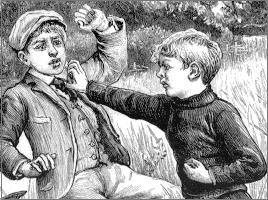
"Each city block had it's small band of hooligans and we had to be careful that we didn't end up where the older and ruffer hooligans hung out." He leaned forward and added, "Sometimes," he changed the direction of the conversation, "grandfather would take me down to the docks to watch our grain being loaded into the ships ..." His pipe needed to be refilled and his fingers with a special pipe tool worked out the burnt remains as he continued his story. "One of the tricks the older boys had taught me the year before was to take a stick and trip the man carrying the sacks of grain and when the man fell he landed into the water and made a great splash. Everyone laughed and laughed and thought it was very very funny."
"Grandpa!" I ejected in disdain, "you didn't?"
"It was very funny," expressed grandpa who couldn't understand a females distaste for such trickery. "And he made a very big splash."
The humor of it all was lost to me, since I felt the trick wasn't a trick but something a spoiled little brat did to someone who couldn't defend himself and was just trying to earn a day's work to feed his poor family.
Now, looking back, I tried to visualize that scene which grandpa had found so funny. Perhaps it was I who was a bit "stuffy" because I couldn't find the humor in a moment of time so far removed from my own life. Perhaps, if I had been there I, too, would have laughed.... The man was fished out and given an extra coin for having fallen prey to the young Roemmich boy. And, no real damage was done. Even the lost of two sacks of grain was nothing. The Bolsheviks hadn't occurred in history in 1905 so no one in our family was dying of starvation....
When business was done, the empty wagons rolled along the old road back to Worms....
1906 was the last time the Roemmichs took their grain to Odessa because the following year they would be selling everything and migration to the USA to a new land where the wheat would grow and new sheep would be bought.
The wheat growing in the middle of the USA had been brought there by the German-Russians. The Merino sheep had been breed in Russia and were rugged enough to survive the winters in the Dakotas.
My grandpa would return to Odessa in 1919 as part of the evacuation of "certain important people" who were to be given protection of the USA government from the Russian Bolsheviks.....
The political arena in Odessa in 1918-1919 was difficult to understand and is often left out of American history books because this was a very small corner of the world and few saw it as important. The Bolsheviks, the anit-Bolsheviks, the German-Russian farmers, and all the other factions were aware of the importance of this Black Sea port town. So, I like to speak to people who were in Odessa at that time.
"Grandpa," I pushed out another question, "what was Odessa like in 1919?"
"The hooligans were wearing uniforms with red stars," grandpa issued with a sterness he rarely uses in his speech. "And people were afraid because those who knew they couldn't leave with us, knew they were going to die in the hands of those hooligans."
"Did you get a chance to visit Worms in 1919?" I asked.
"I flew over Worms but we couldn't land .....," he informed me. "Wasn't time.... Had to get back to the city..."
Finally, we had reached the story I wanted to hear. "Why were you up there flying around?"
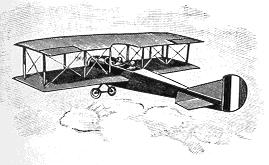
"This fellow needed to practice his flying and when I told him I had never been up he asked me to join him, so, I did," told grandpa.
"Do you you remember his name?" I dug deeper into his memory.
"No," slowly uttered Grandpa as he tapped his pipe against the glass ashtray that was a deep yellow-brown. "He had a Irish name but he wasn't Irish. He spoke German just as good as I and he said he had lived in Odessa when he was younger....." He was searching his head for a name. Most people who have dexlixia have excellent memories because all their life they memorize names, places and things so people will not know they can't read. But, he had grown very tired and he couldn't remember this time. "He worked for the Brits but they didn't like him and made faces behind his back. But, I liked him. He was smart and he knew the Brits didn't like him, but he didn't care. He told me that he cared about Russia and thought the Bolsheviks were disciples of the devil...."
I waited for his memory to bring out the name of this friend.
Then he spoke the little ditty he had told me so long ago.
"Really, O'Reilly.
Reilly. Oh, really!"
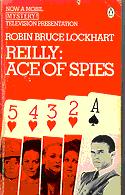
Reilly: Ace of Spies was written by Robin Bruce Lockhart
Later, I would discover the friend of grandpa was a man known as Sidney Reilly, the man Ian Flemming based his character James Bond.
After some research, I found evidence that Sidney Reilly was in Odessa the same time as my grandfather and the US Army's evacuation and that he had just learned to fly. The name, Reilly, which he used was an alias. His given christian name had been Jarig [Georg] Hahn His mother's husband was Colonel Hahn who was appointed a position in the 8th Army headquartered in Odessa.
I often wish grandpa was alive, now, so I could explain to him who Reilly was and what he was doing in Odessa..... Reilly spent his last coin fighting the Bolsheviks, who in the end, assassinated him......
"Grandpa, how was Odessa different in 1919 than it was in 1905?" I quickly added, "Of course, I realize you were terrible young in 1906..... so....."
"Havoc. Panic. Tears. Lots of tears....." he recalled without hesitation.
The Bolsheviks arrested and sent the Roemmichs to Siberia , or , assassinated those who had remained in Russia during the Russian Revolution and later. My grandpa's memories are the only small remnants of what once was once his world....
The true art of memory comes only with the ability to have paid attention to the treasures caught in the mind, therefore, I feel it is important for his memories to be written down and continued to be told so the younger generations know the old man whom I loved dearly and miss.
I closed my eyes and can see him seated on a huge old grain wagon with his grandfather as they happily talked and laughed as the steppes pass by them for all eternity.
-------
Notes: Actually, it turns out that Edward's natural father was the man he thought was his grandfather, Jakob W. Roemmich b. 1851. .
It was Pauline, his mother, who is my source.
Evidently, Jacob Roemmich, Pauline's husband, the son of Jakob W. Roemmich was in the army and she was living with Jacob J.'s family, and, was, therefore, under the obligation to please her father-in-law, Jacob W..... Women in those times had no personal rights. Rape was never uttered. She held her secret. She bore Edward and when her husband, Jakob J. returned from the army on leave, he accepted Edward as his own and never contested his birth, therefore, legally, Edward was Jakob J. Roemmich's.
When I asked my grandfather if he ever wondered if Jakob J. was his real father, he replied, "There is no doubt in my mind that he was not my father." I asked him if he could guess who his real father was. He shook his head. Then I told him what his mother, my great grandmother Pauline had revealed, "Your real father was your grandfather [Jakob W. Roemmich]." His eyes looked deeply into mine to see if I was telling him the truth. "Your mother said he was." He was suddenly full of so much happiness that he looked like he was going to dance around the room. "I loved him so so very much and he loved me!" voiced my grandfather, who was indeed a very happy man. And, it makes me smile even after so many years that he was so very glad that Jakob W. Roemmich was his father.
The photograph sent to me by Opal R. White is her father August Reimann hauling grain from Roy to the rail's head in American Falls - 1910. It was a thirty-five mile trek that would take them all day. See page 45 for more photographs and story.

|
See GRAIN HARVESTS |
|

